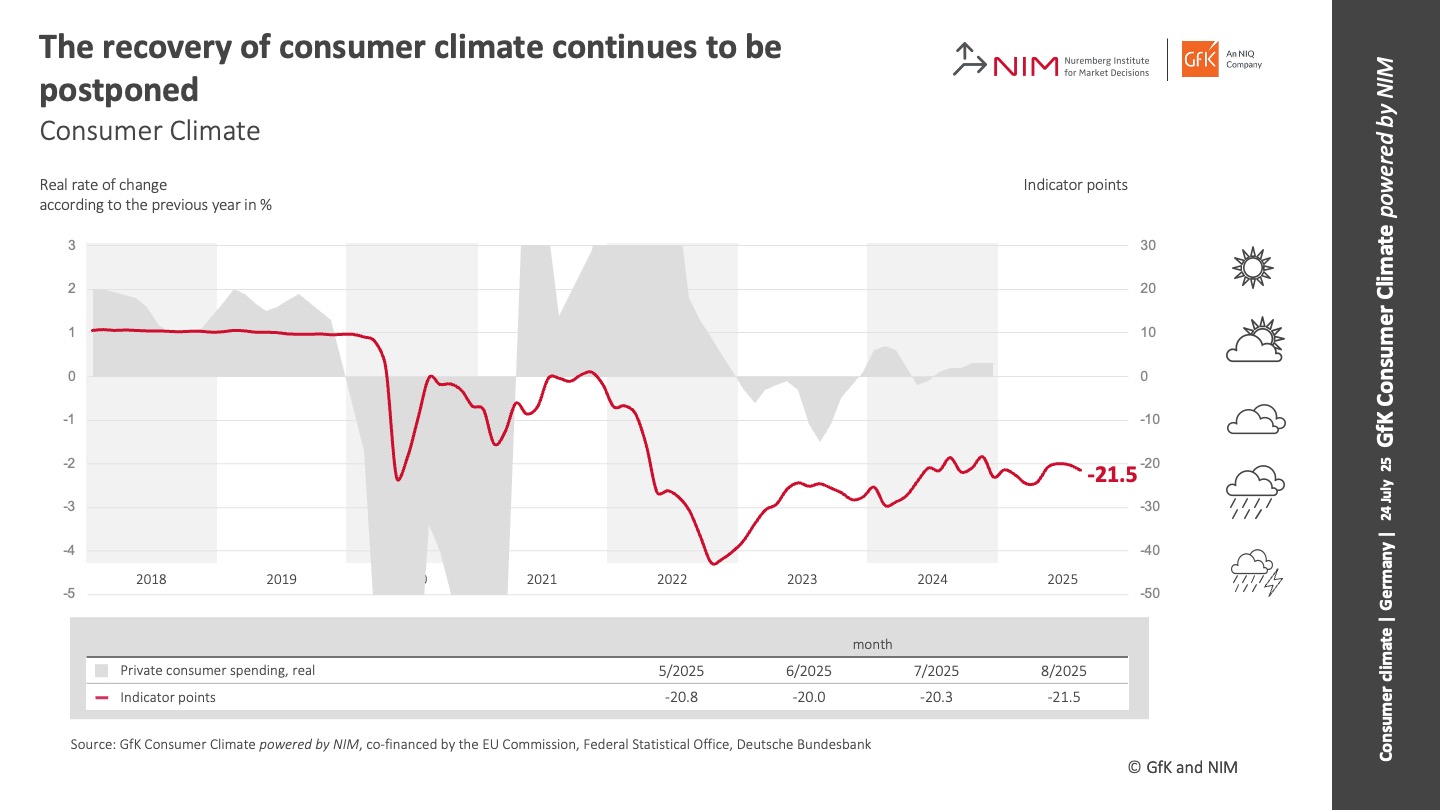Economic expectations and willingness to buy decline
Nuremberg, July 24, 2025 – As in the previous month, consumer sentiment in Germany showed no clear trend in July. Income expectations rise once again, while the economic expectations cloud noticeably. The willingness to buy also declines, while the willingness to save continues its upward trend. The Consumer Climate indicator forecasts a decrease of 1.2 points to -21.5 points for August 2025 compared with the previous month (-20.3 points). These are the findings of the GfK Consumer Climate powered by NIM for July, which has been published jointly by NIQ/GfK and the Nuremberg Institute for Market Decisions (NIM), the founder of GfK, since October 2023.
In addition to the decreasing willingness to buy, the continuing increase in the willingness to save is the main reason why the Consumer Climate has fallen for the second time in a row. The savings indicator rises by 2.5 points to 16.4 points in July, marking the third consecutive increase. This is the highest value in almost one and a half years. The last higher value was measured in February 2024, at 17.4 points.
“The recovery in consumer sentiment continues to be postponed, because the willingness to save has risen again,” explains Rolf Bürkl, Head of Consumer Climate at NIM. “The majority of consumers still consider it advisable to hold back their money rather than spend it on major purchases. Our in-depth analyses show that general uncertainty, the need to be prepared for difficult situations, and high prices, especially for food, are the main reasons for this. A sustainable recovery in consumer sentiment will therefore depend on reducing uncertainty and thus providing greater planning security. Then consumers will be more willing to spend money on purchases again.”
Income expectations remain on track for recovery
German consumers’ income expectations for the next 12 months continue their clear upward trend in July. The 2.4-point increase in July is the fifth increase in a row. At 15.2 points, the income indicator has also reached a 12-month high. The last time a better value was recorded was in July 2024, when the indicator stood at 19.7 points.
Consumers clearly expect their real household income, i.e., their purchasing power, to improve in the coming months. In addition to solid wage agreements and pension increases, a moderate inflation rate is also contributing to this: It recently fell to 2.0 percent, which is exactly in line with the European Central Bank’s (ECB) target.
Willingness to buy shows losses
IHowever, the willingness to buy is not benefiting from the improved income prospects this month. It lost 3 points to -9.2 points. The last time a lower value was recorded was in February of this year, at -11.1 points.
Consumers therefore remain cautious about making major purchases, despite improved income prospects. A lack of planning security due to ongoing uncertainty is causing them to remain cautious about spending for the time being.
Economic expectations suffer severe setback
In contrast to income prospects, economic expectations suffer a severe setback in July after five consecutive increases. The indicator loses 10 points, falling from 20.1 points to 10.1 points. Compared with the same period last year, the increase is only 0.3 points.
This has put a significant damper on hopes for an economic recovery this year. Continued uncertainty among consumers is holding back economic optimism. The sword of Damocles in the form of US tariff policy continues to hang over consumers.
The following diagram shows how the Consumer Climate indicator has developed over recent years:

Planned publication dates in 2025 (CET):
- Wednesday, August 27, 2025, 8 a.m.
- Thursday, September 25, 2025, 8 a.m.
- Tuesday, October 28, 2025, 8 a.m.
- Thursday, November 27, 2025, 8 a.m.
- Friday, December 19, 2025, 8 a.m.
Media Contacts
NIQ: Corina Kirchner, T +49 911 395 4570, corina.kirchner@nielseniq.com
NIM: Sandra Lades, T +49 911 95151 989, sandra.lades@nim.org
About our method
The survey period for the current analysis was 3 to 14 July 2025. The results are extracted from the “GfK Consumer Climate powered by NIM” study and are based on around 2,000 consumer interviews per month conducted on behalf of the European Commission. The report presents the indicators in the form of graphics accompanied by brief comments. Consumer sentiment refers explicitly to all private consumer spending. Depending on the definition used, however, retail accounts for only around 30 percent of private consumer spending. Services, travel, housing costs, healthcare services, and the wellness sector as a whole account for the rest. Again, this does not apply to retail sales, but instead to total consumer spending. Like all other indicators, willingness to buy is a confidence indicator. It indicates whether consumers currently consider it advisable to make larger purchases. Even if they answer “Yes” to this question, there are two further requirements for making a purchase: The consumer must have both money required for such a large purchase and must also see a need to make this purchase. Furthermore, this only concerns durable consumer goods that also require a larger budget.
GfK Consumer Climate powered by NIM
The GfK Consumer Climate survey, which is being conducted regularly since 1974 and monthly since 1980, is regarded as an important indicator of German consumer behavior and a guiding light for Germany’s economic development. Since October 2023, the Consumer Climate data collected by GfK has been analyzed and published jointly with the Nuremberg Institute for Market Decisions (NIM), the founder of GfK. By joining forces, it will be possible to invest further in the analysis and development of the Consumer Climate study to gain an even better understanding of the background to changes in consumer confidence.
GfK – a NielsenIQ company
For 90 years, clients around the world have trusted us to provide data-driven answers to key questions for their decision-making processes. We support their growth through our comprehensive understanding of buying behavior and the dynamics that influence markets, brands, and media trends. In 2023, industry leaders GfK and NielsenIQ have merged to offer their clients unparalleled global reach. With a holistic view of retail and the most comprehensive consumer insights, provided by forward-looking analytics on state-of-the-art platforms, GfK is driving “Growth from Knowledge.” More information is available at www.nielseniq.com.
About NIQ
NielsenIQ (NIQ) is a leading consumer intelligence company, delivering the most complete understanding of consumer buying behavior and revealing new pathways to growth. NIQ combined with GfK in 2023, bringing together two industry leaders with unparalleled global reach. Our global reach spans over 90 countries covering approximately 85% of the world’s population and more than $7.2 trillion in global consumer spend. With a holistic retail read and the most comprehensive consumer insights—delivered with advanced analytics through state-of-the-art platforms—NIQ delivers the Full View™.
For more information, please visit www.niq.com
About NIM
The Nuremberg Institute for Market Decisions (NIM) is a non-profit research institute at the interface of academia and practice. NIM examines how consumer decisions change due to new technology, societal trends or the application of behavioral science, and what the resulting micro- and macroeconomic impacts are for the market and for society as a whole. A better understanding of consumer decisions and their impacts helps society, businesses, politics, and consumers make better decisions with regard to “prosperity for all” in the sense of the social-ecological market system. The Nuremberg Institute for Market Decisions is the founder of GfK. Further information is available at https://www.nim.org.




